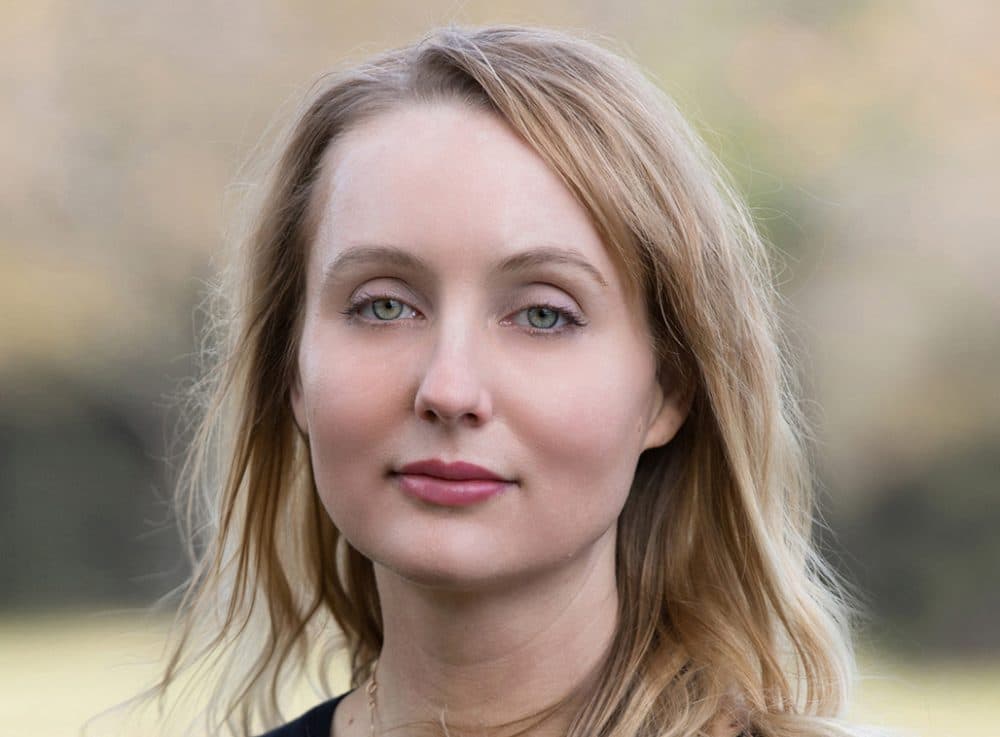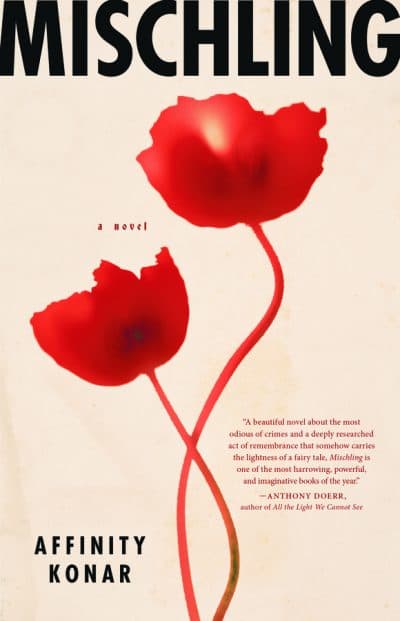Advertisement
Holocaust Twin Experiments Are The Focus Of A Debut Novel
Resume
Affinity Konar's critically acclaimed debut novel, "Mischling," follows a pair of twin girls who are sent to Auschwitz.
They end up in Josef Mengele's lab and struggle to survive, after being subjected to a series of brutal experiments. Konar drew inspiration from real-life stories of Auschwitz survivors, and talks with Here & Now's Robin Young about the book.
Book Excerpt: 'Mischling'

By Affinity Konar
We were made, once. My twin, Pearl, and me. Or, to be precise, Pearl was formed and I split from her. She embossed herself on the womb; I copied her signature. For eight months we were afloat in amniotic snowfall, two rosy mittens resting on the lining of our mother. I couldn’t imagine anything grander than the womb we shared, but after the scaffolds of our brains were ivoried and our spleens were complete, Pearl wanted to see the world beyond us. And so, with newborn pluck, she spat herself out of our mother.
Though premature, Pearl was a sophisticated prankster. I assured myself that it was just one of her tricks; she’d be back to laugh at me. But when Pearl failed to return, I lost my breath. Have you ever had to live with the best part of yourself adrift, stationed at some unknowable distance? If so, I am sure you are aware of the dangers of this condition. After my breath left me, my heart followed suit, and my brain ran with an unthinkable fever. In my fetal pinkness, I faced this truth: without her, I would become a split and unworthy thing, a human incapable of love.
That is why I followed my sister’s lead and allowed the doctor’s hands to tear me out and smack me and hold me to the light. Let us note that I never cried during the ruptures of this unwanted transition. Not even when our parents ignored my wish to be named Pearl too.
I became Stasha instead. And with the chore of birth complete, we entered the world of family and piano and book, of days that baffled by in beauty. We were so alike—we were always dropping marbles from the window onto the paving stones and watching them descend the hill with our binoculars, just to see how far their little lives would take them.
That world, teeming with awe, ended too. Most worlds do.
But I must tell you: There was another world we knew. Some say it was the world that made us the most. I want to say that they are wrong, but for now, let me tell you that our entry into this world began in our twelfth year of life, when we were huddled side by side in the back of a cattle car.
During that journey of four days and four nights, we cheated our way into survival under Mama’s and Zayde’s instruction. For sustenance, we passed an onion back and forth and licked its yellow hide. For entertainment, we played the game Zayde made for us, a game called the Classification of Living Things. In this form of charades, you had to portray a living thing, and the players had to name the species, the genus, the family, and so on, all the way to the encompassing brilliance of a kingdom.
The four of us passed through so many living things in the cattle car; we postured from bear to snail and back—it was important, Zayde emphasized in his thirst-cracked voice, that we organize the universe to the best of our too-human ability—and when the cattle car finally came to a stop I stopped my charade too. The way I remember it, I was in the middle of trying to convince Mama that I was an amoeba. It’s possible that I was portraying some other living thing and that I am remembering it as an amoeba now only because I felt so small in that moment, so translucent and fragile. I cannot be sure.
Just as I was about to admit defeat, the door to the cattle car rolled open.
And the incoming light was so startling that we dropped our onion on the floor, and it rolled down the ramp, a smelly and halfeaten moon that landed at the feet of a guard. I imagine that his face was full of disgust, but I couldn’t see it—he held a kerchief over his nostrils while issuing a series of sneezes, and he stopped sneezing only to hover his boot above our onion and cast an eclipsing shadow over the tiny globe. We watched the onion weep as he crushed it, its tears a bitter pulp. He then resumed his approach, and we scrambled to hide in the shelter of Zayde’s voluminous coat. Though we had outgrown Zayde as a hiding place long ago, fear made us smaller, and we contorted within the coat folds beside his dwindled body, leaving our grandfather a lumpy, many-legged figure. In this shelter, we blinked. Then we heard a sound—a stomp, a shuffle—the guard’s boots were immediately before us.
“What kind of insect are you?” he asked Zayde, rapping each of the girlish legs that emerged beneath the coat with a walking stick. Our knees smarted. Then the guard struck Zayde’s legs too. “Six legs? You are a spider?”
It was clear that the guard had no real understanding of living things at all. Already, he’d made two errors. But Zayde didn’t bother to point out that spiders aren’t insects and that, in fact, they are possessors of eight legs. Traditionally, Zayde enjoyed issuing playful, singsong corrections, as he liked to see all the facts put to rights. In that place, though—it was too dangerous to express any intimate knowledge of creatures that crawled or were considered lowly, lest you be accused of bearing too much in common with them. We should have known better than to make an insect of our grandfather.
“I asked you a question,” the guard insisted while issuing another rap to our legs with his stick. “What kind?”
In German, Zayde gave him facts: His name was Tadeusz Zamorski. He was sixty-five years old. He was a Polish Jew. He ended there, as if all were told.
And we wanted to continue for him, we wanted to give all the details: Zayde was a former professor of biology. He’d taught the subject at universities for decades but was an expert in many things. If you wanted to know about the insides of a poem, he would be the one to ask. If you wanted to know how to walk on your hands or find a star, he’d show you. With him, we once saw a rainbow that ran only red, saw it straddle a mountain and a sea, and he toasted the memory of it often. To unbearable beauty! he’d cry, eyes abrim. He was so fond of toasts that he made them indiscriminately, for nearly any occasion. To a morning swim! To the lindens at the gate! And in recent years, there was this, his most common toast: To the day my son returns, alive and unchanged!
But as much as we would have liked to, we said nothing of these things to the guard—the details caught in our throats, and our eyes were tearful because of the death of the nearby onion. The tears were the onion’s fault, we told ourselves, nothing more, and we wiped the drops away so that we could see what was happening through the holes in Zayde’s coat.
Excerpted from the book MISCHLING by Affinity Konar. Copyright © 2016 by Affinity Konar. Reprinted with permission of Little, Brown and Company.
Guest
Affinity Konar, author. Her debut novel is "Mischling."
This segment aired on September 27, 2016.